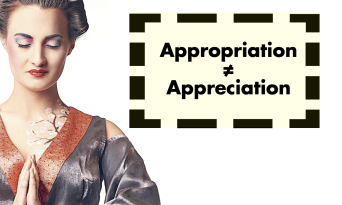If there’s something I DON’T want to write about, it’s cultural appropriation. It’s a no-win topic. So why tackle it? Because it keeps bubbling up in my circle of friends and acquaintances.

In response to a New York Times article, an NPR piece stated Commentary: Cultural Appropriation Is, In Fact, Indefensible. And it’s from there that I’ll describe the phenomenon:
“Writer Maisha Z. Johnson offers an excellent starting point by describing it not only as the act of an individual, but an individual working within a “‘power dynamic in which members of a dominant culture take elements from a culture of people who have been systematically oppressed by that dominant group.’
“That’s why appropriation and exchange are two different things, Johnson says — there’s no power imbalance involved in an exchange. And when artists appropriate, they can profit from what they take, while the oppressed group gets nothing.”
This distinction is important, and I believe addresses Frank S. Robinson’s post about “the newest gambit of politically correct grievance agitprop.”
The phenomenon is not new, actually. According to the Washington Post, the term goes back to the 1970s or ’80s. Bo Derek’s cornrow hairstyle in the 1979 movie 10 was a REAL issue to some folks, but I’ll admit I didn’t get it.
Weekly Sift had this:
“Cultural appropriation is when somebody from a dominant culture tries to acquire fame and fortune (or just look cool) by using stuff created by a dominated culture…. Sometimes it’s done with respect and a share-the-wealth attitude. (Paul Simon didn’t just steal the South African sound, he toured with and helped popularize authentic South African bands.)” [There are some who would disagree.]
“Sometimes it’s annoying and disrespectful, but relatively harmless (like Anglos who have no idea what Cinqo de Mayo commemorates ‘celebrating’ by drinking too much tequila).
“And sometimes it results in a significant injustice, like Elvis becoming a musical icon while the black pioneers he imitated couldn’t get radio time.” Presley became a source of conflict in my own household growing up.
My father HATED Elvis, but I thought he was bringing his own rockabilly sensibilities to the mix. (Now, if you want cultural appropriation, look at Pat Boone, whose vapid Tutti Fruiti squeezed Little Richard’s version out of the marketplace.) I had none of Elvis’ music until I went to college.
I saw this article about a Portland, OR “burrito eatery being shut down after the two white women who ran it were criticized for making food from a culture that wasn’t theirs.” I believe one or both of them jokingly suggested they “stole” the recipe, which helped generate outrage. I find that was a most unfortunate outcome.
I would suggest that the denigration of a culture, especially knowingly, such as Ted Nugent’s headdress in this context could also be seen as cultural appropriation.
So I believe cultural appropriation, different from cultural exchange, exists, and it’s undesirable. But I accept I don’t always know where the line is drawn.
For ABC Wednesday
